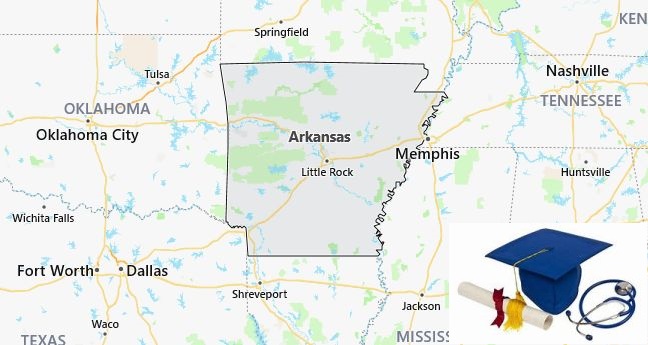If you intend to purse a nursing degree in Arkansas, you should aim at the top nursing schools in Arkansas. Let’s show below, which schools have a standard curriculum for nursing education and are recognized by the market.
See the latest nursing school ranking of the state and check the top nursing colleges among the institutions and the best evaluated courses in Arkansas.
List of Best Nursing Colleges in Arkansas
| Rankings | Nursing Universities | Nursing Colleges |
| 1 | University of Arkansas for Medical Sciences Mailing Address: 4301 W. Markham Street, Slot 529, Little Rock, AR 72205-7199 Phone Number: (501) 686-5374 E-mail: leflerleanne@uams.edu Website Homepage: http://nursing.uams.edu/ |
College of Nursing |
| 2 | Arkansas State University Jonesboro Mailing Address: PO Box 910, State University, AR 72467-0069 E-mail: admissions@astate.edu Website Homepage: http://www.astate.edu/conhp/nursing/ |
School of Nursing |
| 3 | University of Central Arkansas Mailing Address: 201 Donaghey Avenue, Conway, AR 72035 Phone Number: (501) 450-3119 E-mail: bgwilliams@uca.edu Website Homepage: http://uca.edu/nursing/ |
Department of Nursing |

Arkansas Recent History
Slave labor was very widely used on cotton plantations, by 1860 a quarter of the population of Arkansas were slaves, and one in five Arkansans belonging to the white race was a slave owner. True, most of these slave owners had few slaves, only twelve percent of them owned more than twenty people. But it was these few planters who were the richest people in Arkansas and practically determined the politics of the state.
Since then, and for a long time, life in Arkansas was largely determined and dependent on the problems of racial relationships.
During the American Civil War, the state of Arkansas joined the Confederacy. During the war years, thousands of state residents, black and white, who fought on the side of the Confederacy or northerners, died.
After the end of the American Civil War, Arkansas went through a difficult period of reconstruction. During the war, the economy and social structures in the state were destroyed, almost by the time the hostilities ended, there was no government in the state and anarchy reigned.
The result of the victory of the US federal government was the abolition of slavery, namely, the “cotton” agriculture of Arkansas was based on the labor of slaves. Wealthy planters were not going to lose their influence and in every possible way prevented the reforms. Representatives of the US Democratic Party, who defended the interests of this group of the population of Arkansas, carried out bills that limited the participation in elections of the “lower” social classes on various grounds (literacy rate, residence requirement). As in other southern US states, the Ku Klux Klan was gaining strength in Arkansas.
Nevertheless, changes were taking place, not only did African Americans gain the right to vote, but even a few black citizens of Arkansas were elected to the state legislature.
Traditionally, Arkansas’ main transportation arteries have been rivers, the most important being, of course, the Mississippi. Basically, cotton plantations were located in the valley of this greatest river in the United States. With the advent of railroads, which provided quick and convenient access to various regions of Arkansas, another boom in the state economy began.
Now Arkansas grew not only cotton, but also strawberries, peaches, apples, and vegetables. The timber industry, the production of lumber, furniture, and other wood products developed rapidly. Mining began in Arkansas, mainly coal.
At the beginning of the 20th century, many immigrants from Europe came to Arkansas, mostly Germans, Irish, Slovaks.
At the same time, in the first decades of the 20th century, Arkansas, like other states of the US South, was affected by the “Great Migration”. So many blacks in the state moved north, where they could expect to get well-paid jobs in the factories of the ” industrial belt ” of the United States. In addition, in the northern states they had the same rights as the white population, not only nominally, but also in fact.
The issue of civil rights and racial discrimination remained relevant for Arkansas for a long time. The population of this predominantly rural state was very conservative, especially in matters of religion and race. Traditionally, the Ku Klux Klan has been strong in Arkansas, with the Ku Klux Klan naming not only blacks but also Jews, Catholics, and foreigners as their targets.

